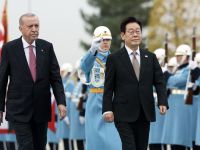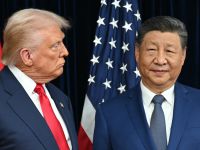A speech by US President George W. Bush to the United Nations General Assembly in New York on Saturday night, in which he discussed the advancement of the peace process and the cessation of terror and violence, drew praise Sunday from both Israel and the Palestinians, according to the Tel Aviv-based Haaretz newspaper.
Israeli officials were quoted as saying that Bush's speech backed Israel's position in its own fight against “terrorism.”
"Our positions were strengthened... there is no difference between good terror and bad terror, an end to incitement, and national aspirations do not justify targeting innocent civilians," Israel's ambassador to the US David Ivri said. "These are things that we have been saying for a very long time," Ivri told Israel Radio on Sunday.
But Israel brushed off Bush's support for a Palestinian state, noting that Prime Minister Ariel Sharon himself had publicly expressed his backing for such an entity. "If you take into account that our prime minister, Mr. Sharon, announced a few weeks ago... that he is in favor of a Palestinian state, I think this idea is ripe and reflects other things," Israel's ambassador to the UN Yehuda Lancry said.
The Palestinian Authority also welcomed the speech, but said that it lacked clarification on an end to Israel's occupation of the West Bank and Gaza Strip.
"In principle it was positive, but what it needs is for the US administration to adopt a clear strategy to implement what Mr. Bush said and to adopt a clear plan to end Israeli occupation of our lands so we can establish our state," Palestinian cabinet minister Hassan Asfour said.
Bush reaffirmed his support for a Palestinian state before the UN on Saturday, without going into detail, as conflict continued in the Occupied Territories, said reports.
"We are working toward the day when two states - Israel and Palestine - live peacefully together within secure and recognized borders as called for by the Security Council resolutions," Bush told the opening of the UN's annual gathering, cited by Reuters.
"We will do all in our power to bring both parties back into negotiations. But peace will only come when all have sworn off forever incitement, violence and terror," the agency quoted Bush as saying.
President Bush, who is determined to soothe Arab and Muslim states in order to consolidate his global anti-terror coalition, has nevertheless been tripped up by the Israel-Palestinian conflict.
Bush has refused to meet Palestinian President Yasser Arafat since taking office, but has met other Arab leaders and Israeli Prime Minister Ariel Sharon.
Arafat was present in the UN hall as Bush spoke on Saturday, but the two had no plans to meet.
US Secretary of State Colin Powell has hinted that Bush will meet Arafat, but only at the time the US deems appropriate.
Bush has faced criticism from ally Saudi Arabia, whose English-language Arab News deemed Bush's refusal to meet Arafat a "calculated snub," and said his stand on regional peace could sink the anti-terror coalition.
Arab leaders have accused the US of caving in to America's pro-Israel lobby, which according to Fortune magazine ranks among the five most powerful lobbying groups on Capitol Hill.
Israeli leaders, meanwhile, appeared to be divided over a new peace initiative by Foreign Minister Shimon Peres.
Israeli political sources said Peres was meeting late on Saturday with Sharon to discuss a new peace plan before leaving for the UN meeting, said Reuters.
However, Sharon is known to oppose several reported aspects of the proposal, including dismantling Jewish settlements in Gaza.
According to the UK-based magazine The Economist, Israel "flouted" the 1993 Oslo peace accords by settling thousands of its citizens on land seized from Palestinian owners in 1967.
Palestinians have said the Israeli peace initiatives are a ploy aimed at obstructing the launch of an international effort to resume deadlocked peace talks, and fear a plan for a dismembered, disarmed and economically dependent state similar to the Bantustans created in apartheid South Africa in the 1980s.
QATARI LEADER: 'LEGITIMATE STRUGGLE' AGAINST ISRAELI OCCUPATION IS NOT TERROR
Qatari Emir Sheik Hamad bin Khalifa Al Thani told the UN General Assembly on Saturday that terrorism should not be confused with legitimate struggles against Israeli occupation.
The emir, speaking on behalf of the Organization of the Islamic Conference - the world's main grouping of Muslim nations - praised Bush and British Prime Minister Tony Blair for their support for the establishment of a Palestinian state.
The Qatari leader said that punishing those responsible for the Sept. 11 terrorist attacks would not prevent similar or even worse such acts in the future, and said terrorism had taken root because the world had ignored the plight of oppressed people in many places, especially the Palestinians.
"It's extremely urgent to put an end to the tragedy of the Palestinian people at the hands of the Israeli occupation forces," he said. "While it is imperative to punish the perpetrators of the Sept. 11 terrorist attacks, it will not, in my opinion, prevent the repetition of similar or even graver acts in future."
ARABS, MUSLIMS WARN OF ANTI-US FEELING IF AFGHAN WAR RUNS THROUGH RAMADAN
Arab academics and Islamic officials are warning that US insensitivity will fuel more resentment if Washington pursues the Afghan war through Ramadan, but say an initiative on the Palestinian cause could save the day, according to AFP.
Most Jordanians have condemned the Sept. 11 terror attacks on the United States and the loss of civilian lives, although officials, analysts and Islamic leaders alike blame this on US policies in the Arab-Israeli conflict.
"America's first crime is to launch a war on the poor and miserable people (of Afghanistan) and this is a crime against humanity. The second crime is to pursue the war during Ramadan," said Abdul Latif Arabiyat.
"This is a provocation because Ramadan is a special month for all Muslims," said Arabiyat, who heads Jordan's Islamic Action Front party, the political branch of the Muslim Brotherhood.
"If America was really sincere in saying that it respects the feelings of Muslims and that the war is not against Islam but on terrorism, it should stop the strikes during Ramadan," he told AFP.
"But America is not sincere and this is a crusade," against the feelings of one quarter of the world's population, he charged, referring to the 1.2 billion Muslims in the world.
Ramadan, the month when the Quran was revealed to Prophet Mohammad, is a special time of worship, charitable acts and purification during which Muslims fast from dawn to dusk, and when they also refrain from smoking and sexual intercourse during daylight hours.
Ramadan this year will start with the sighting of the new moon probably on Friday or Saturday.
Historically, wars have been fought during Ramadan and nothing in Islam bans them. The Prophet Mohammad even chose Ramadan to launch his conquest of Mecca in 632.
But the reality of the world's superpower bashing one of the poorest nations on earth is too much to bear for Muslims.
Sociologist and university lecturer Serri Nasser fears that the pursuit during Ramadan of the US campaign on Afghanistan which was launched on October 7 in reprisal for the Sept. 11 terror attacks will radicalize fundamentalists.
"Negative feelings towards the United States will be intensified in general and perhaps more religious fanatics will tend to fight during Ramadan against the United States," Serri said.
World leaders in and outside the Arab world have called publicly and privately for a halt to the military strikes, to spare the feelings of Muslims whose tempers often run short during Ramadan.
"It is true that people who are fasting have short tempers and this is one of the factors that should be taken into consideration," said Serri.
A daily barrage of media reports of bombs falling on Afghanistan and television pictures of children being killed or maimed would arouse passions, Serri added.
For Kamal Salibi, a professor emeritus of history at the American University of Beirut and director of the Royal Institute for Interfaith Studies in Jordan, the United States is both "clumsy and insensitive."
"The Americans are trying hard, very hard, to bend over backwards, to say they are not fighting Islam, and that is clumsy," this respected historian and author of several books said.
"Their political idiom is not politically understood, like when they say, 'You are either with us or against us'. It is irrational to the rest of the world where people say, 'We're not with you but we're not against you.'"
The United States can win over Arab and Muslim hearts by helping to settle the Palestinian-Israeli conflict, setting up a Palestinian state and ending Israeli occupation of Arab land.
"The Sunni Muslim Arab world is waiting for an opportunity to make love to the West. All they want is a signal and what they are getting instead is blind support for Israel at the expense of the Palestinians," Salibi said.
"A move on the part of the United States will mean high dividends for the Americans and will sway Arab opinion in their favor," he told the agency - Albawaba.com
© 2001 Al Bawaba (www.albawaba.com)







